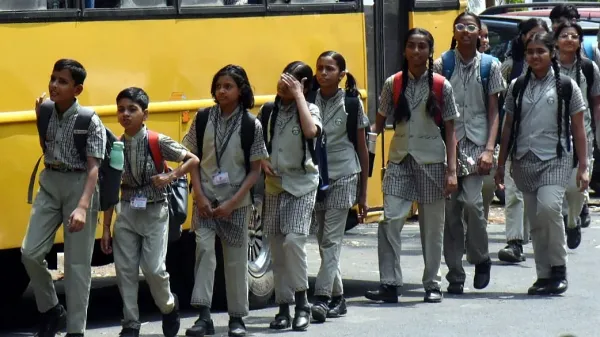
We’ve all been guilty of it at some point. Reaching for the phone at dinner. Handing a restless child an iPad just to finish a meal in peace. Scrolling endlessly while promising ourselves it’s “just five minutes”. Screens have seeped so deeply into our daily lives that their presence feels almost subconscious, yet their hold is anything but harmless.
Today, children as young as four or five are handed devices as pacifiers — tools to keep them quiet, still, or ‘disciplined’. And, lord forbid, when the screen is taken away, the reaction can even resemble severe withdrawal: tears, tantrums, and the unmistakable anxiety of dependency.
So, as families transition from the carefree sprawl of summer into the structure of a new school year, the question feels more pressing than ever: with devices increasingly woven into classrooms and homework, how can parents draw the line between healthy digital literacy and overexposure? Well, a Dubai mum might just have some answers.

Founder Adveta Dwivedi with her kids
Building a screen-free homeIndian expat Adveta Dwivedi has taken this challenge head-on — not only within her own home but also by building a growing community determined to reimagine what childhood can look like without screens.
At 40, Dwivedi balances her role as Chief Digital Officer in the gaming industry with being a mother of two. And despite a career immersed in technology, she and her husband have made a bold, intentional choice: to raise their children — a five-year-old and a toddler — screen-free. “No tablets, no TV, and even with our household help, we follow a strict no-phone policy,” she says. “Phones are only used for emergency calls. Family life is simple, connected, and full of being present in the moment.”
Evenings in their home are phone-free zones, reserved entirely for the children. Weekends are sacred too, filled with nature outings, animal visits, or unstructured play rather than tightly scheduled extracurriculars. “That time has given our kids resilience and imagination,” she explains. “My older child can solve 500-piece puzzles, immerse himself in books for hours, and play independently without needing constant stimulation.”
From book club to UAE-wide communityThe seed for this screen-free parenting community was planted in a children’s book club, recalls Dwivedi. “Every Saturday, families would gather, sometimes bringing their own books, sometimes borrowing from my personal library of more than 300 titles. The idea was to create a space where children could fall in love with reading, and parents could connect over shared values.”

That book club has now grown to more than 60 member families, with shelves lined with classics, encyclopedias, and imagination-building stories. But slowly, the conversations moved beyond books. Parents began talking about the pressures of screens, sharing concerns about gaming, and swapping strategies for reducing screen time at home.
Morphed into a screen-free community, the space has now become a sanctuary for both children and parents. “For the little ones, the focus is on sensory play, storytelling, and the freedom of unstructured play. Older children are encouraged to explore a growing library of more than 200 carefully curated titles, ranging from Animalium to Oceanarium, which spark curiosity and open up long conversations about nature, wildlife, and conservation,” says Dwivedi.
For parents, the community provides a safe space for candid conversations around digital wellness, says Dwivedi. “Parents are grateful for practical insights into platforms like Roblox or Fortnite [games popular amongst kids], understanding what’s safe, what’s risky, and how to manage boundaries.”
The risks of early screen exposureScreens may feel like harmless companions, but the toll they take on children begins earlier than most parents realise. What starts as a distraction at mealtime can rewire attention spans, disrupt sleep, and delay vital developmental milestones.
“The risks are clear and research-backed,” says Dwivedi. “The World Health Organisation (WHO) recommends no screen time for children under 2, and very limited exposure for those aged 2–5. A University of Calgary study in 2019 found that just 30 minutes of daily screen use in toddlers was linked to measurable delays in communication and problem-solving skills.”

In her own home, she witnesses the contrast every day, having created a device-free environment. “My children thrive on books, puzzles, creative play — exactly the kind of skills research shows are undermined by early screen exposure.”
Practical alternatives for parentsFor many parents, going screen-free can sound daunting. Dwivedi insists it doesn’t have to be. “First of all, if a child is under the age of five, I encourage parents to stop screen use immediately and replace it with presence and engagement,” she adds. “The first week may feel challenging, but children quickly adapt, and by the second week they develop a natural rhythm of independent play. After that, parents don’t need to constantly entertain them.”
Dwivedi also believes the shift begins with parents themselves. “Even 20–30 minutes of phone-free, focused time after work can transform a child’s sense of connection,” she explains. “It’s also essential to align caregivers — household help should remain phone-free and instead be guided to support children with reading, puzzles, or simple creative tasks.”
From her experience, the alternatives don’t need to be elaborate. “Independent play setups with open-ended toys like Magna-Tiles, puzzles, and art materials are wonderful. Books and audiobooks spark imagination, and even something as simple as a walk outdoors or unstructured play can inspire more creativity than hours of passive screen use.”
Recalling her own evenings at home, she adds, “In our house, evenings are always fully dedicated to the kids. That consistent presence keeps them thriving and reduces the pressure to rely on screens.”
A bigger visionWhat started as a children’s book club has grown into a full-blown screen-free parenting community, and for Dwivedi, this is just the beginning. “I see it growing into a movement, with us leading conversations around digital wellness and mindful parenting,” she says. “Beyond supporting families at home, I want this community to inspire schools and policymakers to rethink how children are introduced to technology.”
Childhood, she believes, is being rushed into a digital world far earlier than it needs to be. “By Year 4, children in the UAE average around 40 downloaded apps. That’s too much, too soon,” she adds. “My vision is that technology should be introduced later and more mindfully. While basic digital literacy is important, children in Year 2 or Year 3 don’t need heavy device exposure.”
However, at its core, screen-free parenting is less about rigid templates or seeking perfection and more about trial and error. “We’re not rejecting technology, it’s essential to the future,” says Dwivedi. “But childhood deserves a foundation built on books, play, imagination. That’s what creates emotionally resilient, digitally literate children when the time is right.”
somya@khaleejtimes.com
-
'Neither Rahul Will Become PM, Nor...': Amit Shah Attacks Sonia Gandhi, MK Stalin Over Dynasty Politics

-
ICC Women's ODI World Cup 2025: ICC Replaces Bengaluru With Navi Mumbai In List Of Host Venues

-
Kerala Exempts School Uniforms On Festival Days, Launches New Initiatives For Child Safety And Fitness

-
'On Behalf Of Dogs, I Am Thankful To The Supreme Court': John Abraham Reacts To SC Modifying Its Verdict On Stray Dogs

-
Thunderbolts* OTT Release Date Confirmed: When & Where To Watch This MCU Film Online
